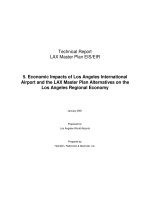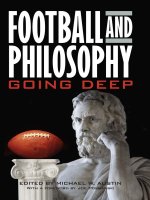university press of kentucky peace out of reach middle eastern travels and the search for reconciliation jun 2007
Bạn đang xem bản rút gọn của tài liệu. Xem và tải ngay bản đầy đủ của tài liệu tại đây (788.87 KB, 208 trang )
Peace Out of Reach
This page intentionally left blank
Peace Out of Reach
Middle Eastern Travels
and the Search for
Reconciliation
Stephen Eric Bronner
THE UNIVERSITY PRESS OF KENTUCKY
Publication of this volume was made possible in part by a grant from the
National Endowment for the Humanities.
Copyright © 2007 by The University Press of Kentucky
Scholarly publisher for the Commonwealth, serving Bellarmine University,
Berea College, Centre College of Kentucky, Eastern Kentucky University,
The Filson Historical Society, Georgetown College, Kentucky Historical
Society, Kentucky State University, Morehead State University, Murray State
University, Northern Kentucky University, Transylvania University, University
of Kentucky, University of Louisville, and Western Kentucky University.
All rights reserved.
Editorial and Sales Offices:
The University Press of Kentucky
663 South Limestone Street, Lexington, Kentucky 40508-4008
www.kentuckypress.com
11 10 09 08 07 5 4 3 2 1
Library of Congress Cataloging-in-Publication Data
Bronner, Stephen Eric, 1949-
Peace out of reach : Middle Eastern travels and the search for
reconciliation / Stephen Eric Bronner.
p. cm.
Includes bibliographical references and index.
ISBN 978-0-8131-2446-9 (hardcover : alk. paper)
1. Middle East Politics and government—1979- 2. Conflict
management—Middle East. I. Title.
DS63.1.B76 2007
956.05—dc22
2007003155
This book is printed on acid-free recycled paper meeting
the requirements of the American National Standard
for Permanence in Paper for Printed Library Materials.
Manufactured in the United States of America.
Member of the Association of
American University Presses
v
In Memory of Christian Fenner (1942–2006)
vi
This page intentionally left blank
vii
Acknowledgments ix
1 Cosmopolitan Engagements 1
2 Lessons from Afghanistan 13
3 The Iraqi Debacle: Democracy, Desperation, and the
Ethics of War 25
4 Twilight in Tehran 41
5 Syria and Its President: A Meeting with Bashar
al-Assad 59
6 Withdrawal Pains: Gaza, Lebanon, and the Future of
Palestine 75
7 The Middle East Spills Over: The Sudan and the Crisis
in Darfur 93
8 Conspiracy Then and Now: History, Politics, and the
Anti-Semitic Imagination 109
9 Incendiary Images: Blasphemous Cartoons, Cosmopolitan
Responsibility, and Critical Engagement 123
10 Of Reason and Faith: On the Former Cardinal Josef
Ratzinger 135
11: False Antinomies: On Religious Conviction and Human
Rights 147
Notes 161
Index 179
Contents
viii
This page intentionally left blank
ix
I
would like to express my thanks to the people who helped
bring this book to fruition. Lawrence Davidson, Robert
Fitch, Kurt Jacobsen, and Michael Thompson spent their
valuable time reading drafts of the text and offering excellent
comments and criticisms. Linda Lotz was very helpful with
copyediting the manuscript, and Stephen Wrinn and Anne
Dean Watkins at the University Press of Kentucky were sim
-
ply wonderful. Finally, once again, I would like to give special
thanks to my wife, Anne Burns, for her insight and support.
Acknowledgments
x
This page intentionally left blank
1
COSMOPOLITAN ENGAGEMENTS
Cosmopolitan Engagements
1
A
s I am writing these lines, sitting at my desk, U.S. foreign
policy in the Middle East has already unraveled. Af
-
ghanistan is witnessing the resurgence of the Taliban, Iraq is
disintegrating, Iran is at loggerheads with the West, Syria has
retreated further from democracy, Hezbollah and Hamas have
captured the imagination of the Arab world, and conflict in the
Sudan is producing a nightmare for Darfur. Anti-Semitism is
witnessing a rebirth, chauvinism and provincialism are on the
rise, and religious intolerance is again contesting the Enlighten
-
ment legacy. U.S. foreign policy in those Islamic states gripped
by crisis (or the prospect of crisis) now consists of little more
than calls for economic sanctions or threats of military action.
Most of the world looks with dismay at the results of American
interventions in Afghanistan and Iraq, the threats directed
against Iran and Syria, the United States’ uncritical support
for Israeli policy in Palestine and Lebanon, its disregard for
human rights, and what has become its open contempt for
the will of the international community. As a result of all this,
the standing of liberals and moderates in the Middle East has
declined, fragile states have become more fragile, terror has
been embraced as a legitimate tactic, and the Unites States has
been left without genuine diplomatic influence on any regional
actor other than Israel. The Bush administration has opened a
Pandora’s box through its self-righteous posturing and its belief
2
PEACE OUT OF REACH
that democracy can be imposed by a policy of “shock and awe.”
The United States has contributed nothing toward resolving the
regional conflagration sparked by the discrete political crises
and ideological conflicts discussed in this book.
Introducing the need for a different approach is the purpose
behind Peace Out of Reach. As in so many other fields of inquiry,
however, the general interpretation of foreign policy has made
way for empirical and relatively technical works dedicated to
examining the crisis of the moment. This trend has had a de
-
bilitating impact on public discussion and the development of
a strategic intelligence among the citizenry at large. Indeed,
even when a more general perspective is provided, it usually
comes in the form of a huge tome that is undoubtedly consulted
episodically rather than read through with care. Either brev
-
ity or clarity is sacrificed. Here, by way of contrast, I hope to
provide a broad perspective and a set of interconnected stud
-
ies pertaining to the symbolic and practical politics generated
in the Middle East that are readable, empirically grounded,
speculatively realistic, and politically to the point.
Peace Out of Reach is equally informed by my academic re
-
search and activism. Originally, my scholarly concerns revolved
around the European labor movement, fascism, anti-Semitism,
and Western political theory beginning with the Enlighten
-
ment. I learned much, and my work on these themes shaped
my political worldview. My interest in the Middle East grew
following the terrorist attack of 9/11, the assault on Afghani
-
stan, and my anger with the misguided policies of the Bush
administration. That interest was only intensified by my visits
to Iraq—prior to its invasion by the United States—as well as
to Iran, Syria, Israel, the Occupied Territories, and the Su
-
dan. My experiences influenced the chapters devoted to each
country, if only because my travels had a political component.
I participated in what has been termed “citizen diplomacy,” in
3
COSMOPOLITAN ENGAGEMENTS
which delegations of American citizens meet unofficially with
governmental officials, representatives of nongovernmental
organizations, and intellectuals from nations fearful of belliger
-
ency by the Bush administration. This activity in conjunction
with Faculty for Israeli-Palestinian Peace and groups associ
-
ated with Conscience International during my visits to Iraq,
Iran, and Syria resulted in the writings included here, as well
as statements and petitions that may not have shaken the world
but were read and signed by tens of thousands of Americans.
Neoconservatives and even some mainstream liberals
criticized my colleagues and myself for aiding the enemy and
meeting with politicians who had blood on their hands. Little
did it matter that these trips were undertaken with no external
financial backing or that we prided ourselves on our indepen
-
dence from the U.S. government as well as from the states and
officials we visited. Some partisans of the Right insisted that
the very act of visiting rogue states or speaking with dictators
necessarily turned us into their apologists. It is exactly this
kind of “us versus them” mentality that lies at the root of every
provincial and authoritarian understanding of politics. A right-
wing student of mine said that the problem with my analysis of
Israeli politics was that it didn’t evidence any particular “love”
for that country. But politics is neither a soccer game nor the
love boat. It requires objectivity, holding the emotional claims
of both sides at a distance, and a willingness to learn about na
-
tions and cultures foreign to our own. My friends and I believed
that our attempt to foster dialogue with people different from
us and with officials who did not always share our basic beliefs
was honorable, ethical, and extremely instructive.
Perhaps we were “manipulated.” That is, perhaps the media
in Iraq, Iran, and Syria portrayed us as critical of U.S. foreign
policy—but we were critical of U.S. policy. Is it legitimate for
American citizens to make these criticisms only on American
4
PEACE OUT OF REACH
soil? That we offered our opinions on a foreign stage did not
imply that, somehow surreptitiously, we were providing an
apology for dictators and aiding Islamic fascism. None of us
played the role of what Lenin termed the “useful idiot,” and
we never romanticized the “other” in the manner of days gone
by. Our statements, in fact, expressed dismay over the constric
-
tion of civil liberties and sharp criticisms of the authoritarian
states we visited. Our explicit aims were to help correct the
misinformation generated by the American media and prevent
the United States from arbitrarily exercising its military power
without regard for international law, the national interest, or
the everyday people who suffer the consequences.
There is no need for pretense: spending a week or two in
this or that nation does not transform a guest into an expert.
But these trips were invaluable for me in terms of learning how
American intentions are perceived, understanding the anger
produced by double standards, and fostering what I have called
elsewhere a “cosmopolitan sensibility.” My visits allowed me to
encounter directly some of those who would bear the costs of
American foreign policy, and I gained a new understanding of
what the military blithely refers to as “collateral damage.”
There is something else that needs to be said: Americans
seem incapable of understanding the sinking estimation—and
it is, according to numerous mainstream polls, still sinking—of
their country by so much of the world. These visits clarified
for me that, in this vein, Americans must learn more about the
“other” if they are to learn anything about themselves. But it
works both ways. The states we visited remain very much sealed
off from the West and suffer from that peculiar provincialism
born of authoritarian rule. Our visits gave our hosts a chance
to encounter the “other” as well—hopefully to good effect.
Peace Out of Reach evidences what has always been a cos
-
mopolitan element in my thinking, whose roots surely derive
5
COSMOPOLITAN ENGAGEMENTS
from my background as a child of German-Jewish exiles but
also from my appreciation of the European Enlightenment
and of those outside of Europe who—like Bolivar, Tagore, and
Mandela—sought to foster its radical legacy. As things now
stand, it seems as if progressives must navigate between what
has often been called the “clash of civilizations.” This clash is
seen as cultural in character, insofar as it pits a secular and lib
-
eral Occident against a rabidly xenophobic and fundamentalist
Orient. In my travels it became clear that the real clash is the
one that pits secular and liberal elements against nationalist and
fundamentalist elements in both the West and the East.
Imperialism has undercut the insularity of these two regions,
and the interaction between them will grow due to increased
opportunities for travel, information sharing, and communica
-
tion. Modernity will undoubtedly penetrate traditional socie-
ties and create new opportunities for democratic change. But
these must ultimately develop organically rather than through
the intrusion of nations with new imperialist ambitions and
officials virtually bereft of knowledge about the societies they
wish to transform. Citizen diplomacy can prove useful in this
regard. Building bridges and creating linkages between those
with similar values on both sides of the divide is, in my view,
the task of the cosmopolitan in a post-9/11 world.
Peace Out of Reach is predicated on the practical need to judge
foreign policy according to criteria that are cosmopolitan and
democratic. The introduction of such concerns is perhaps a
product of the Vietnam War. Prior to the 1960s, there had been
relatively little domestic protest against the numerous inter
-
ventions undertaken by the United States since it entered the
world stage as a great power in 1898. The framers of foreign
policy basically engaged in secret diplomacy outside the public
purview. That changed irrevocably not only because of the
6
PEACE OUT OF REACH
American defeat in Vietnam, which left a lasting imprint on my
generation, but also because of the advent of the Internet and
the possibility of a genuinely global exchange of information.
The “war on terror” has also shown that large-scale undertak
-
ings in foreign policy demand more than a national consensus.
They require international support as well. Commitment to
building a cosmopolitan sensibility is therefore no longer a
luxury; it is a necessity in achieving that kind of support.
First introduced in my book Ideas in Action, the cos
-
mopolitan sensibility should not be understood as a purely
formal philosophical category or a purely legal commitment
to universal human rights. Immanuel Kant originally defined
cosmopolitanism as the ability to feel at home everywhere. The
sensibility projected by this idea is thus informed by empathy
for those “others” who bear the costs of political action. The
cosmopolitan sensibility provides a social content to human
rights, even as it highlights the moment of solidarity in resisting
the exercise of arbitrary power and the dead weight of provin
-
cial traditions. It also presumes the goodwill necessary to step
outside oneself, criticize the cruder forms of national interest,
and engage the “other” in a meaningful dialogue. In terms of
foreign policy, therefore, the cosmopolitan sensibility requires
that any genuinely democratic undertaking be transparent and
accountable with respect to the material interests and ethical
intentions informing it and that moral and practical limits be
placed on what is permissible. In the United States, since the
Vietnam War, foreign policy has been subjected to a new public
morality that insists on transparency and accountability and that
poses a direct challenge to the arbitrary and unilateral exercise
of power in foreign affairs.
Sadly, the Bush administration never really accepted any
of this. Committed to a self-serving globalism rather than cos
-
mopolitanism, its officials lied to the American public and to
7
COSMOPOLITAN ENGAGEMENTS
the international community as the invasion of Iraq became
imminent. Neither the material interests nor the ethical inten
-
tions of the United States in pursuing its war on terror were
ever made transparent. Misinformation about the aims of the
war on terror and the threat to national security was combined
with the imperialist quest for oil and geopolitical advantage,
support for Israel, and billions of dollars in contracts to favored
corporations. A peculiar arrogance informed the twin beliefs
that only the United States—and perhaps a few of its close
allies—has the right to engage in a preemptive strike and that
doing so will evoke limitless gratitude from liberated peoples
who wish only “to be like us.”
In my view, ideas like these, as much as any form of military
incompetence, produced a lack of concern about the broader
implications of regime change or the development of an exit
strategy in Iraq. Such provincial arrogance on the part of neo
-
conservatives and certain liberals also made it difficult for them
to appreciate how other nations understand the widespread use
of torture at prisons such as Abu Ghraib and Guantanamo Bay
and the daily attacks by Americans on Iraqi civilians. It also
informed their spin on the massacres in towns such as Haditha,
the ruthless carnage inflicted on Falluja, the rubble that is now
Ramadi, and the environmental disaster unleashed through
depleted uranium, multiple oil spills, and the pollution of the
Tigris. There is little sense of how all this can be identified with
the original attempt to foster democracy or fulfill the United
States’ mission for the region. In the eyes of the world, the for
-
eign policy of the Bush administration increasingly resembles
that of a corporate thug—half obsessed with power and half
paranoid at the thought of that power being challenged. This
has led to erosion of the international support for the United
States following the 9/11 attacks.
Style counts in foreign affairs. The international commu
-
8
PEACE OUT OF REACH
nity views the Bush administration as unconcerned with the
opinions of other states, convinced of its moral superiority,
and intent on having its own way no matter what the costs to
others. Its style is to make plans in secret, treat critics as en
-
emies, and—even with half a trillion dollars spent on defense
every year—continually insist that U.S. national security is
threatened. Paranoia mixes with belligerency. Diplomacy ap
-
pears to be little more than a kind of unsatisfying foreplay that,
form dictates, must occur prior to the real thing: the preemp
-
tive strike. Of course, it’s not as if the Democratic Party has
developed much of an alternative in foreign affairs. Most of its
major representatives are equally culpable for the resentment
of the world community, given their support of an ill-defined
war on terror and the invasion of Iraq. Nevertheless, it remains
important to distinguish between neoconservative ideologues
bent on a mission of world salvation and cowed liberal politi
-
cians standing just a bit to the left of their xenophobic rivals
while content to follow the leader.
True believers come in many varieties—some believe in their
religion, some in their nation, some in their ethnic commu
-
nity—but they share much in common. What marks them all is
a lack of concern for the “other,” a conviction that their belief
is uniquely privileged, a dogmatic sensitivity to criticism, and
a willingness to sacrifice their fellow citizens in the name of
their state, their house of worship, or their particular organi
-
zation. In their view, the “people” become identified with the
institution and its ambitions. What marks the cosmopolitan
sensibility, however, is the refusal to accept at face value that
kind of identification or the legitimacy of those “sacrifices” that
true believers always demand. Recognition of constraints, costs,
and the balance of power thus becomes more important than
romantic slogans about “struggle” and the liberating missions
9
COSMOPOLITAN ENGAGEMENTS
of great powers that usually harbor imperialist ambitions. The
cosmopolitan sensibility rests on emphasizing reciprocity, re
-
jecting the use of a double standard, and placing moral limits
on action. The principal concern of the cosmopolitan is not the
interests of states, religious institutions, or various organiza
-
tions but the interests of those who will suffer as a result of the
decisions made by true believers in their name.
Unclear about the enemy, unconcerned with international
law, inclined to inflate the implications of every conflict, and
profoundly ignorant of the radically different cultural and
historical traditions in the nations making up the world com
-
munity, the true believers in the Bush administration have
crudely pursued their war on terror. They have little sense of the
need for modest aims and a realistic assessment of constraints.
These elements are especially important when dealing with
nations in the Middle East that have been subject to Western
imperialism and lack a democratic tradition, an indigenous
bourgeoisie, and a viable civil society. Perhaps Vice President
Dick Cheney and his neoconservative cabal really believed that
simply toppling the regime of Saddam Hussein would cause
democracy to flourish. More likely, their concern was to secure
a geopolitical advantage for the United States in the Middle
East, establish military bases, and control oil, while eliminating
yet another enemy of Israel. What counts, in any event, is the
way the American national interest was betrayed and the price
that is still being paid by the citizens of the Middle East.
Peace Out of Reach critically examines the assumptions
behind an ethically suspect and politically misguided foreign
policy, the costs of what have been clumsily portrayed as altru
-
istic attempts to export democracy, and emerging ideological
trends fueled by cultural insensitivity, anti-Semitism, and fear
of the Enlightenment legacy. It is concerned with curbing un
-
bridled ambitions and inhibiting those passions associated with
10
PEACE OUT OF REACH
intolerance and violence. That is possible only by recognizing
the limits of power and resisting the attempts—as one Bush
official so delicately put it—to “make reality” as the reigning
superpower and its allies see fit.
Peace Out of Reach calls on policy makers to demonstrate
a plausible connection between the ends they seek and the
means they use to realize them. The idea that the end justi
-
fies the means has always rested on casuistry. It only begs the
question of what justifies the end, and to this question, there
can be only one answer: the means used to achieve it. Neocon
-
servatives like to claim that the democratic Iraq of the future
will justify the sacrifices made in the present. Of course, with
an eye trained on the American public, they fail to mention
that it is the Iraqis who must live with the devastation. Even if
a democratic order ultimately emerged in Iraq, the dozens of
cities destroyed, the environmental devastation, the hundreds
of thousands driven from their homes, and the many tens of
thousands of Iraqi deaths required to achieve it—one hun
-
dred per day, and fourteen thousand in the first six months of
2006—have already rendered the cost too high. It is not the
case that the foreign policy of the Bush administration is an
expression of the national interest, that it has made areas of
geopolitical importance more secure, and that it has promoted
not merely democracy but also a democratic way of life.
Democracy involves more than elections. It also depends
on the practice of civil liberties, some degree of social justice,
a diverse civil society, and a general spirit of reciprocity and
tolerance. Virtually nowhere in the Middle East have these
preconditions for democratic change been strengthened. Its
ruling elites are anachronisms, and the United States is paying
a high price in Arab public opinion—what is known as the Arab
“street”—for supporting them. Liberal hawks and conservative
dogmatists have converged in their refusal to consider the
11
COSMOPOLITAN ENGAGEMENTS
structural constraints existing in those nations they wish to
transform. No state with artificially drawn borders and without
an indigenous bourgeoisie, a democratic labor movement, and
a liberal political tradition has ever been turned into a democ
-
racy overnight. Building democracy in such states requires
an organic development from within. That development is
capable of being nurtured but incapable of being forced. As
Peace Out of Reach suggests, to ignore this reality is to indulge
in the illusion of power.
This page intentionally left blank
13
LESSONS FROM AFGHANISTAN
Lessons from Afghanistan
2
S
eptember 11, 2001, marked the beginning of a new millen-
nium.
1
It was a traumatic event for all who lived through
it, even those who did not lose family or friends but merely
watched the tragedy on television. Not since the attack on
Pearl Harbor in 1941 had the United States been struck by an
enemy on its own soil. This particular enemy was not even a
nation-state but rather an international terrorist movement, al
Qaeda, inspired by a rigidly anachronistic version of Islam and
led by Osama bin Laden. Americans’ initial shock and sadness
quickly turned to anger. Little time was spent reflecting on the
supposed reasons for the attack on the World Trade Center and
the Pentagon—namely, U.S. support for corrupt Arab regimes
such as those of Saudi Arabia and Egypt, as well as support for
Israeli policy with regard to the Palestinians. Talk of revenge
was rampant, and there was a sense, legitimate or not, of inno
-
cence violated. Hatred of Islamic fundamentalism intensified,
and the belief in an inevitable conflict between Occident and
Orient, or what neoconservatives such as Bernard Lewis and
Samuel Huntington termed a “clash of civilizations,” gripped
the popular imagination. There was never any doubt that the
United States should seek retribution for the victims of 9/11.
This was the context in which the United States decided to
bomb Afghanistan and overthrow its Islamic fundamentalist
leadership—the Taliban—which was openly protecting bin
Laden and al Qaeda.
14
PEACE OUT OF REACH
International law does not deny a nation the right to defend
itself when attacked.
2
President George Bush insisted that
Afghanistan hand over every terrorist, close every training
facility, and give the United States the authority to carry out
inspections.
3
These were difficult demands for the Taliban to
accept. But rejecting them meant ignoring both the imperative
for action dictated by a national consensus in the United States
and support from an international coalition that was appalled
by the savage attacks of 9/11. The Taliban clearly misread the
situation, and their diplomatic attempts at negotiation were,
according to one observer, like “grasping smoke.” Their ef
-
forts were seen as a form of stalling. The Bush administration
wished to act quickly, and its desire to avenge a criminal act
against innocent civilians and bring the culprits to justice—if
not begin a “war on terror” against an ill-defined enemy—ini
-
tially seemed reasonable.
Attacking Afghanistan did not eliminate al Qaeda, whose
transnational organization has appropriately been called a “net
-
work of networks.” But the bombing of Afghanistan succeeded
in destroying a number of training bases and a barbaric regime
that had served as an important sanctuary for al Qaeda.
4
Mili-
tants such as Osama bin Laden and the leader of the Taliban,
Mullah Omar, were forced to go underground, flee to remote
areas, or retreat into Pakistan. Soon, however, the United States
seemed to lose interest in finding these new celebrities. More
importantly, four thousand Afghan civilians were killed, tens of
thousands were wounded, and half a million were left home
-
less.
5
These numbers dwarf the numbers of Americans killed
and wounded by the assault of 9/11. It forces any decent person
to at least consider what Albert Camus called the “principle
of reasonable culpability” when engaging in military action, as
well as the practical and moral costs of ignoring it.
Whether this imbalance in sacrifice and lack of proportion
-









